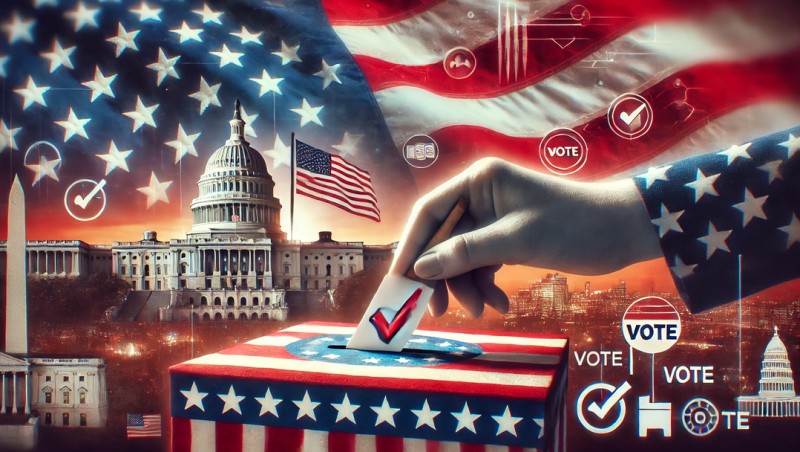
The 2024 U.S. elections are set to be one of the most closely watched political events globally, with far-reaching consequences for both domestic and international policies. As Americans prepare to cast their votes on November 5, 2024, the election promises a contest not only of candidates but also of ideologies, policies, and visions for the country's future. Here’s an overview of the main aspects shaping this election, from key issues to the candidates and their potential impact on the United States and beyond.
Key Issues Driving the 2024 Elections
Several issues are dominating the 2024 U.S. election, and they reflect the diverse concerns of American voters:
- Economic Stability and Inflation: Following a period of high inflation and fluctuating markets, economic stability remains a primary concern. Both parties are expected to propose competing economic strategies, focusing on balancing growth with inflation control, tackling national debt, and addressing income inequality.
- Healthcare: Healthcare reform has long been a central issue in American politics, and 2024 is no exception. Rising costs, debates over government-subsidized healthcare, and policies to address the opioid crisis and mental health issues are likely to be hot topics.
- Climate Change and Environment: Environmental issues have gained momentum as more Americans express concern over climate change. Candidates are expected to outline policies on renewable energy, carbon emissions, and climate resilience.
- Immigration and Border Security: Immigration policies are also in the spotlight, with debates surrounding border security, pathways to citizenship, and how to manage undocumented immigration effectively.
- Gun Control: Gun legislation remains contentious, particularly following recent incidents of gun violence. Policies around background checks, assault weapon bans, and mental health services will likely be discussed by the candidates.
- Social Justice and Civil Rights: Topics like policing reform, racial equality, gender rights, and LGBTQ+ issues continue to resonate with American voters and are likely to shape campaign platforms in 2024.
The Main Candidates and Their Platforms
The 2024 presidential race is anticipated to feature some familiar faces, as well as a few newcomers, each presenting their distinct policies and appeal to voters:
Here’s an updated overview of the main candidates in the 2024 U.S. presidential election, including Independent and third-party candidates:
1. Kamala Harris (Democrat)
- Background: Currently serving as Vice President, Kamala Harris is the first woman, first Black woman, and first person of South Asian descent to hold this office. Before her vice presidency, she was a U.S. Senator from California and the state’s Attorney General.
- Platform:
- Healthcare: Advocates for expanding access to healthcare and building on the Affordable Care Act.
- Climate Change: Supports aggressive action to combat climate change and transition to renewable energy sources.
- Social Justice: Emphasizes racial and gender equality, criminal justice reform, and protection of voting rights.
- Economy: Focuses on middle-class economic growth, raising the minimum wage, and increasing support for working families.
2. Donald Trump (Republican)
- Background: Former President (2017-2021) and businessman, Donald Trump is seeking a second term in office after losing to Joe Biden in 2020.
- Platform:
- Economy: Promises to revive the economy through tax cuts and deregulation, emphasizing support for small businesses.
- Immigration: Advocates for stricter immigration policies, including border security measures and continued construction of the border wall.
- Foreign Policy: Focuses on an "America First" approach, promoting national interests in trade and international relations.
- Crime and Safety: Strong emphasis on law and order, supporting police funding and measures to reduce crime.
3. Jill Stein (Green Party)
- Background: A physician and environmental activist, Jill Stein previously ran for president in 2012 and 2016. She is known for her strong environmental focus and advocacy for social justice.
- Platform:
- Green New Deal: Advocates for comprehensive legislation to address climate change and create green jobs.
- Healthcare: Supports Medicare for All, aiming for universal healthcare coverage.
- Social Justice: Promotes racial and economic justice, including reforms in policing and the criminal justice system.
- Foreign Policy: Calls for non-interventionist foreign policy and reducing military spending.
4. Chase Oliver (Libertarian)
- Background: An activist and community organizer, Chase Oliver focuses on issues like personal freedoms and economic libertarianism.
- Platform:
- Civil Liberties: Strong emphasis on personal freedoms, including privacy rights and criminal justice reform.
- Economy: Advocates for reducing government regulation and lowering taxes to stimulate economic growth.
- Foreign Policy: Supports a non-interventionist approach, advocating for peace and diplomacy over military action.
- Healthcare: Favors market-based solutions and reducing government involvement in healthcare.
5. Cornel West (Independent)
- Background: A prominent philosopher, political activist, and author, Cornel West is known for his work on race, justice, and democracy. He has previously been affiliated with the Green Party.
- Platform:
- Social Justice: Advocates for racial and economic justice, emphasizing the importance of addressing systemic inequalities.
- Healthcare: Supports Medicare for All and aims for universal healthcare access.
- Economy: Promotes policies to reduce income inequality and increase workers' rights.
- Foreign Policy: Favors a non-imperialist foreign policy focused on diplomacy and humanitarian efforts.
6. Claudia De la Cruz (Independent)
- Background: An activist and community leader, Claudia De la Cruz is involved in social justice issues, particularly around immigrant rights and economic equity.
- Platform:
- Economic Justice: Advocates for policies that promote economic equity and support for marginalized communities.
- Healthcare: Supports universal healthcare and access to essential services for all individuals.
- Immigrant Rights: Fights for the rights of immigrants and against anti-immigrant policies.
- Education: Promotes equitable access to quality education and resources for all students.
These candidates represent a diverse array of political ideologies and approaches to key issues facing the United States in the upcoming election.



